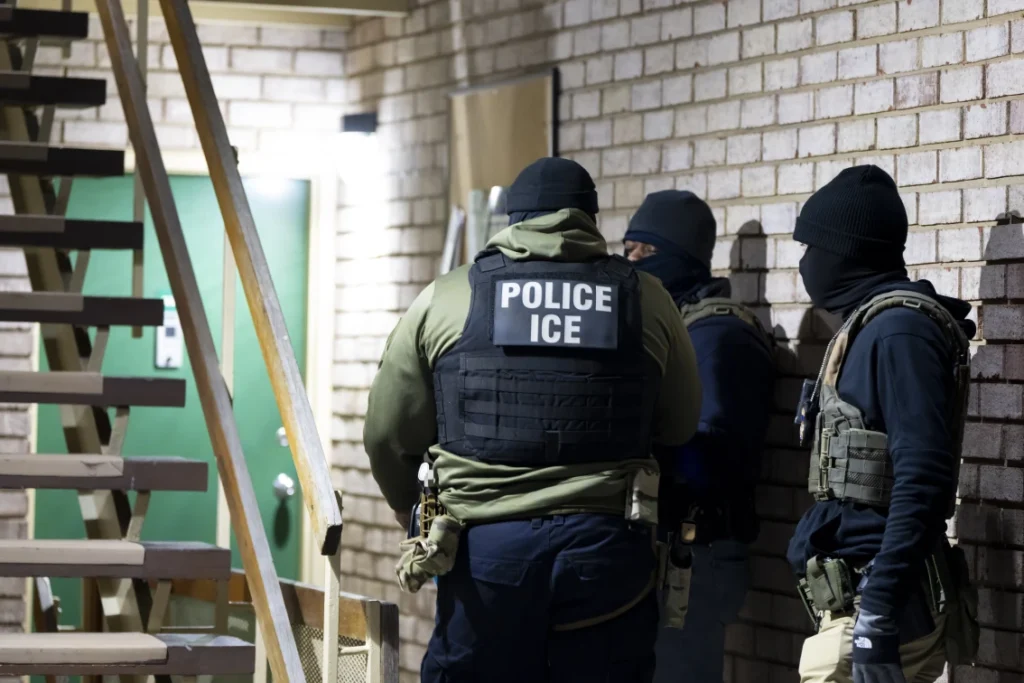
Faith Nyasuguta
A controversial deportation flight has landed in the small Southern African kingdom of Eswatini, marking a dramatic turn in the Trump administration’s hardened immigration policies – and as planes take off, immigration agents on the ground are also knocking on doors, pressuring landlords for private tenant information in an unprecedented push to root out people living in the United States illegally.
The Department of Homeland Security (DHS) announced Tuesday that the so-called “safe third country deportation flight” landed successfully in Eswatini, carrying immigrants from multiple nations whose home governments had refused to take them back. “These depraved monsters have been terrorizing American communities,” said DHS spokeswoman Tricia McLaughlin on social media. “They are now off of American soil.”
According to DHS, the deportees include people convicted of severe crimes. One Vietnamese national had been convicted of child rape. A Jamaican was found guilty of murder, robbery and weapons possession. A Laotian faced multiple counts of murder, burglary and aggravated assault. Also on board were a Cuban citizen convicted of murder, aggravated battery and reckless driving, and a Yemeni convicted of homicide, assault and cruelty to a dependent adult.

In a similar move, South Sudanese authorities confirmed last week that eight men deported from the United States are now under government custody after landing in Juba on Saturday. According to Apuk Ayuel, a spokesperson for South Sudan’s foreign ministry, the men arrived under “standard deportation procedures” and were currently being screened for safety and identity checks.
U.S. officials said these men – originally from Cuba, Laos, Mexico, Myanmar, Vietnam, and South Sudan – were part of a Supreme Court case that cleared their forced removal after being convicted of violent crimes in the U.S.
The deportations sparked backlash at home, with civic leader Edmund Yakani warning, “South Sudan is not a dumping ground.” The country’s fragile services, worsened by oil revenue slumps and civil war in neighboring Sudan, make resettling deportees even more challenging. The incident highlights growing concerns as the U.S. expands third-country deportations under Trump’s revived mass removal policy.

The policy enabling these “third country” deportations received a boost last month when the U.S. Supreme Court sided with the administration, allowing it to deport migrants to countries other than their own – and without first giving them a chance to prove that returning home could place them in harm’s way.
A memo from U.S. Immigration and Customs Enforcement (ICE) dated July 9 says that deportees may be given as little as six hours’ notice, despite the agency’s general guideline of 24 hours. The memo emphasized that migrants could be moved to any country that promises not to persecute or torture them “without the need for further procedures.”
Human rights advocates warn that such accelerated removals raise major concerns about due process, the potential for abuse, and whether third countries like Eswatini – which has no prior experience hosting deportees from Asia, the Middle East, or the Caribbean – have the capacity or systems to absorb these arrivals safely.
But the Trump administration’s dragnet does not end on the tarmac. In cities like Atlanta, Boston, and Los Angeles, immigration authorities have reportedly turned their attention to landlords – demanding they hand over sensitive tenant files. Subpoenas obtained by the Associated Press show immigration agents asking for leases, rental applications, forwarding addresses, copies of IDs, and even details about other people living with tenants.

Eric Teusink, a real estate lawyer in the Atlanta area, said several of his clients were shocked when they received what appeared to be legal orders demanding full access to tenant files. “A rental application can tell you almost everything about a person – where they work, their family status, their contacts,” Teusink said. “This feels like a fishing expedition.”
The two-page subpoenas, signed by an officer from U.S. Citizenship and Immigration Services’ anti-fraud unit but not by a judge, threaten landlords with contempt of court if they fail to comply. Yet many legal experts say these administrative subpoenas lack the force of a court order.
“The danger here is overcompliance,” said Stacy Seicshnaydre, a Tulane University housing law professor. “Just because a landlord gets a subpoena doesn’t mean it’s legitimate. And if landlords hand over records without cause, they may violate the Fair Housing Act or tenants’ privacy rights.”
For some property managers, the demands feel both intrusive and confusing. Anthony Luna, who oversees about 1,000 rental units in Los Angeles through his company Coastline Equity, said rumors of ICE subpoenas have stirred fear among tenants. “If they’re going after criminals, why aren’t they using court documents? Why do they need housing provider files?” Luna asked. “We don’t plan to comply with anything not signed by a judge.”

Indeed, the immigration dragnet is operating in a legal gray area. ICE subpoenas – administrative orders signed by agency supervisors – have long been used to access records from state or local police departments but rarely from private landlords. Yeshiva University law professor Lindsay Nash said they spiked dramatically under Trump’s first term, but landlords are still an unusual target.
Legally, ICE must file a lawsuit in federal court to enforce a subpoena that’s been ignored, giving landlords an opportunity to contest it. But Nash notes that many property managers are unaware of this. “Many people see these subpoenas, think that they look official, think the language sounds threatening, and therefore respond – even when these subpoenas are arguably overbroad,” she said.
Tricia McLaughlin, the DHS spokeswoman, defended the tactic, saying, “We are not going to comment on law enforcement’s tactics surrounding ongoing investigations. However, it is false to say subpoenas from ICE can simply be ignored.”
Back in Eswatini, the government has remained silent about its role in hosting the deported criminals – or whether it was pressured by the U.S. into accepting them. The tiny landlocked monarchy is better known for its sugar exports and wildlife reserves than for international immigration deals.
Many questions remain unanswered: Will Eswatini detain or monitor the deportees? What happens to their legal status? And will other “safe third countries” be roped in as the administration broadens its deportation campaign?

Behind both the flights and the landlord subpoenas lies a clear pattern: the Trump administration’s relentless effort to reduce the number of undocumented immigrants, even if it means bending long-standing legal norms. Critics say this amounts to criminalizing entire communities and sowing fear that landlords could become unwilling informants.
While DHS celebrates the removals as a victory for public safety, immigrant advocates argue that due process is eroding. They warn that aggressive tactics, including surprise deportations with minimal notice and the collection of personal tenant data, risk violating civil rights and stoking distrust.
For landlords like Teusink’s clients, the uncertainty is real. “These are people who manage properties, not federal agents,” Teusink said. “They shouldn’t be deputized to help immigration police.”
And for the deportees now on unfamiliar soil thousands of miles from where they once called home, there is no clear path forward. They remain living symbols of an immigration crackdown that – for better or worse – is pushing the boundaries of law, ethics, and international cooperation.
As the Trump administration doubles down, Eswatini’s unexpected role as a dumping ground for convicts may soon be echoed in other far-off nations, while American tenants wonder if their rental applications could become the next clue leading ICE to their door.
In the meantime, critics and communities brace for what comes next – planes in the sky, knocks on doors, and a growing debate over how far a government should go to deport the unwanted.
RELATED:








